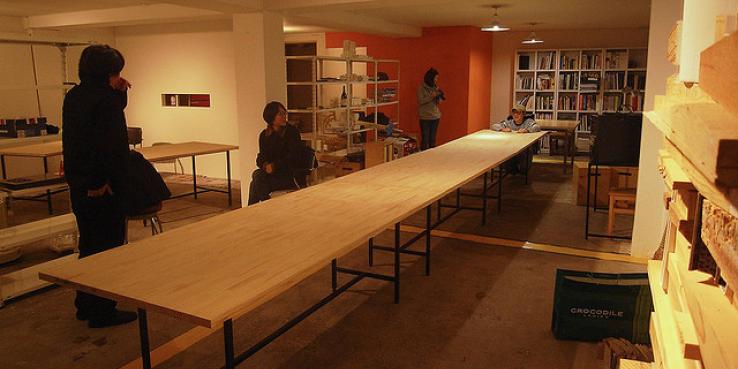Co-working studio [Photo by flickr user ahopsi]
According to a piece in Sunday’s Chronicle, tech employment in San Francisco is approaching its dot-com peak:
"The city had an estimated 32,180 tech jobs last year, compared with 34,116 in 2000, according to an analysis of state employment data by real estate consultant Jones Lang LaSalle. In 2004, the number of tech jobs had fallen to 18,210."
The most interesting thing about the growth in jobs is that it hasn’t been accompanied by proportionate growth in office space; while dot-com companies occupied 325 square feet per worker in 2000, today they occupy about 175, and that number has been falling each year. The Chronicle speculates that this is driven by the relative frugality among today’s dot-coms, which is certainly possible. While there are lots of companies out there, venture capital firms have generally been making smaller investments during this cycle.
But according to analysis we're doing here at SPUR, the increasing density of the workforce could also be due to the following trends in Bay Area work:
More telecommuting: Many more are working from home or at non-traditional offices. This is due to an increase in self-employment and to the rise in telecommuting among tech workers. While San Franciscans aren’t necessarily telecommuting more now than in past years, data from the 2005 and 2009 American Community Surveys do show increases in many other Bay Area cities, like Berkeley (where 12% of residents telecommute), Mountain View (7%) and Oakland (6%).
Mobility strategies: Everyone knows that smartphones make knowledge workers more mobile. This means that a lot of work can, and does, happen outside of the office. It also means that at any given moment during the work day, as few as 30 percent of workers are at their desks. Companies see this low utilization and decide to reduce overall private space for workers. This leads them to move to open-plan layouts and shared offices, as Deloitte did last year. Part of the motivation is to cut costs, but the trend also reflects a re-purposing of space as companies forgo private offices in exchange for more meeting space.
Co-working: Particularly among the startups that are adding to that tech-job number in SF, co-working arrangements are popular: firms (or individuals) join together to share office amenities like conference rooms and kitchens. These setups cut down significantly on space needs.
Whatever the reasons, the move to smaller office footprints should play to San Francisco’s strengths. Working in San Francisco usually means being able to commute without a car, which means firms don't have to build the amount of parking needed in places like Silicon Valley. San Francisco also has dense urban districts packed with amenities, which can complement a scaled-down workplace. In some ways, San Francisco makes life hard for a growing firm. But while addressing those challenges, the city should not lose focus on what it has to offer. After all, these young tech firms are in the city for a reason — and it’s not because it’s cheap.
